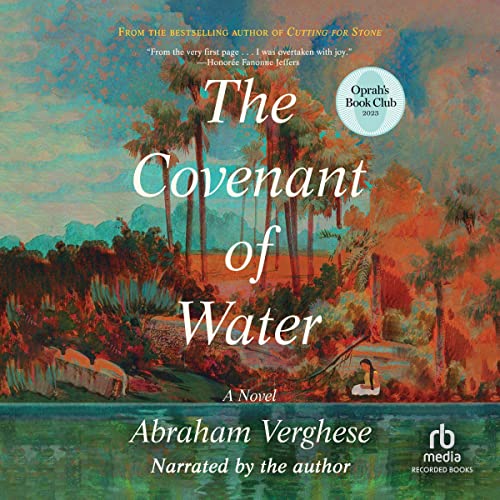The Covenant of Water -Audiobook
$35.00 Original price was: $35.00.$6.99Current price is: $6.99.
| Author | |
|---|---|
| Narrator | |
| Audio Length |
31 hours |
| Release Date |
May 2, 2023 |
| Publisher | |
| Format |
Audiobook |
| Delivery |
Instant Download |
| ISBN |
9781705070246 |
SKU:
9781705070246
Categories: Fiction, Current Bestsellers, General Fiction, Literary, Sagas
Tags: Abraham Verghese, Covenant of Water, General Fiction, Sagas
BUY WITH SPECIAL DISCOUNT
The Covenant of Water -Audiobook
Trust (Pulitzer Prize Winner) Audiobook
Fourth Wing By Rebecca Yarros-Audiobook
Friends, Lovers, and the Big Terrible Thing: A Memoir Audiobook
The Covenant of Water is a 2023 novel by physician and author Abraham Verghese. The book was published by Grove Atlantic and has since been met with critical acclaim. It tells the story of an Indian family living in southwest India, in the Kerala state, with the narrative spanning three generations, from 1900 to the 1970s.
Synopsis:
In The Covenant of Water, Verghese weaves a poignant and intricate tale of family, history, and the enduring power of human connection. The novel follows the lives of the Ipe family, whose story unfolds against the backdrop of a changing India.
The Ipe family is plagued by a mysterious affliction: every generation, at least one child is born with a strange sensitivity to water. This affliction, known as “the water curse,” manifests in various ways, from debilitating illness to an uncanny ability to sense the emotions of others through water.
As the novel progresses, we follow the lives of each generation of Ipes as they grapple with the consequences of the curse. We learn about their hopes, dreams, and fears, and we witness their struggles against prejudice and societal expectations.
Rated 0 out of 5
0 reviews
Rated 5 out of 5
0
Rated 4 out of 5
0
Rated 3 out of 5
0
Rated 2 out of 5
0
Rated 1 out of 5
0
Reviews
Clear filters
Add a review Cancel reply
RELATED PRODUCTS
Golden Son – Audiobook
$19.99
Midnight Crossroad – Audiobook
$9.90



David –
ok good
B. Goddard –
When asked about India, I reply, “India is all of life all at once.” That is one of the strong feelings I had when finishing The Covenant of Water, Abraham Verghese’s latest oeuvre. I don’t think I’ve read another novel that makes me feel so much a part of humanity: the mingled destinies of land and family. The Covenant of Water is a long book, it is a rare book, one that returns in kind the attention a reader gives it. When I completed the novel, I went back to the opening paragraph: I never imagined that the action of the book would stream into the great novel that it is. The characters are intricately formed and connected. I’m put in mind of the title of another contemporary great novel—what strange paradise.
The character Ammachi dominates the first 70% of the novel, becoming big where once she was small. She is the maternal power of duty and embrace. Mariamma dominates the last 30%. She is the feminist of foresight and strength. Her neuturing of Dr. Brijmohan Sarkar in the room where she was meant to be quizzed by Brijee is one of the great actions scenes of the last 25 years (start at page 539). The male characters of Shamuel, Philipose, and Digby give some measure of gender balance to the novel. And of course there’s Elsie. The fictive village of Parambil in central Kerala of southeastern India is the setting of much of the action. It is surrounded by water, and villagers must learn how to negotiate it: “The water she first stepped into minutes ago is long gone and yet it is here, past and present and future inexorably coupled, like time made incarnate. This is the covenant of water: that they’re all linked inescapably by their acts of commission and omission, and no one stands alone.” Not easy for those who have “The Condition.”
Action ebbs and flows. Expectations for success follow moments of failure, but always the people rise to assert their humanity: “What did humans have in their arsenal for these moments?” The book is in 10 parts and 84 chapters. The tale of this world moves forward until it must stop in a scene where poigancy overwhelms contrivance.
JGH –
It is not the easiest read due to the intertwining of the stories of several different characters. Still it captures one’s imagination through vivid and detailed descriptions of life in India from the perspective of each of the characters while still retaining a focus on the fear of one family of water. It is written from both a personal and medical point of view with descriptions and information about both physical and mental illnesses and both medical and folk approaches to harm reduction in India. It is a big book and my wife started reading it while she was in the hospital where she found it difficult to hold while in her bed. This may explain her rapid recovery so that she could once again read it sitting up. Also, her doctor wanted her to share it with him once she finished so within 10 days after she started we gifted it to him and his office. We are looking forward to reading Cutting for Stone by Abraham Verghese.
Haley –
I’m trying to figure out how to compose my thoughts.
There are things that I don’t like, most of which I won’t mention since they’re spoilers and are rooted in our own morals. I don’t agree with the child marriage that starts off the book, even if it might be historically correct.
But you know what?
I don’t care.
Abraham Verghese wove together 700+ pages of powerful storytelling. This isn’t just a story about the Condition. This is a story about love, family, and the cost of tragedy.
I wouldn’t have ever read this book if my husband wasn’t from Kerala, and I urge any reader who is considering this book to read it. Yes, if you aren’t from Kerala or familiar with it, there might be a lot of googling. You will probably mispronounce the Malayalam wrong because it isn’t in the Malayalam alphabet.
Read it anyway.
Verghese says he takes the blame if anything he wrote about Kerala is wrong. I can’t confirm or deny if this is an accurate version of Kerala. He wasn’t born in Kerala and I’m sure some Malayalis would argue he isn’t the same as a Kerala-born Malayali, but man, does he write like it. Verghese describes Kerala in all its beauty and ugliness. Lush, green landscapes with backwaters but also monsoons that can cause mass flooding.
This book makes me want to return to Kerala. Verghese makes it feel like it’s my homeland, and I’ve never read a book where I’ve felt this way.
Perhaps, my thoughts are incoherent. All I know is if there is a live action adaption (Mollywood, I beg of you), Mammootty better play Big Ammachi’s husband. I would die if Manju Warrier was in it.
Lastly, I leave you with one of my favorite quotes from Uplift Master: “But doesn’t every Malayali dream of returning home?”